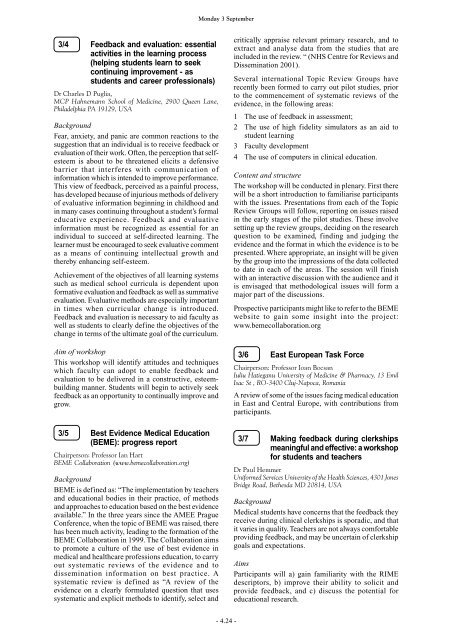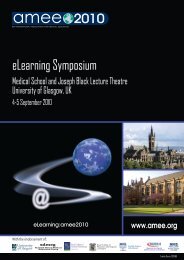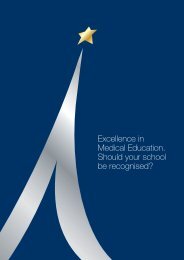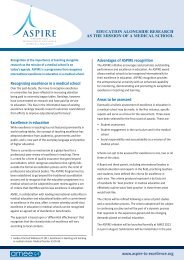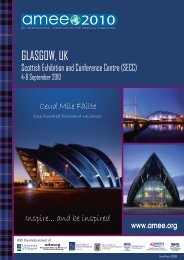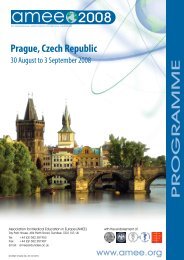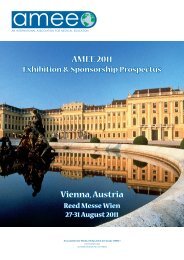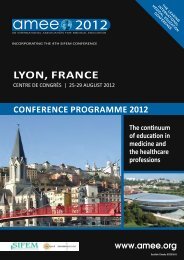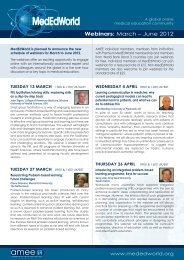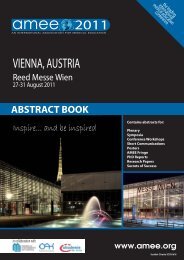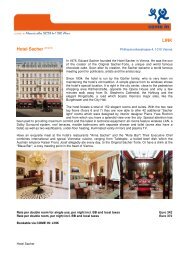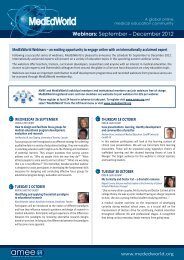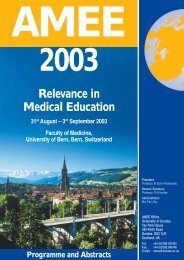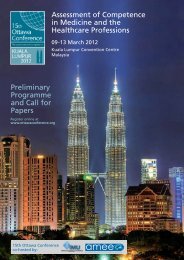AMEE Berlin 2002 Programme
AMEE Berlin 2002 Programme
AMEE Berlin 2002 Programme
Create successful ePaper yourself
Turn your PDF publications into a flip-book with our unique Google optimized e-Paper software.
3/4 Feedback and evaluation: essential<br />
activities in the learning process<br />
(helping students learn to seek<br />
continuing improvement - as<br />
students and career professionals)<br />
Dr Charles D Puglia,<br />
MCP Hahnemann School of Medicine, 2900 Queen Lane,<br />
Philadelphia PA 19129, USA<br />
Background<br />
Fear, anxiety, and panic are common reactions to the<br />
suggestion that an individual is to receive feedback or<br />
evaluation of their work. Often, the perception that selfesteem<br />
is about to be threatened elicits a defensive<br />
barrier that interferes with communication of<br />
information which is intended to improve performance.<br />
This view of feedback, perceived as a painful process,<br />
has developed because of injurious methods of delivery<br />
of evaluative information beginning in childhood and<br />
in many cases continuing throughout a student’s formal<br />
educative experience. Feedback and evaluative<br />
information must be recognized as essential for an<br />
individual to succeed at self-directed learning. The<br />
learner must be encouraged to seek evaluative comment<br />
as a means of continuing intellectual growth and<br />
thereby enhancing self-esteem.<br />
Achievement of the objectives of all learning systems<br />
such as medical school curricula is dependent upon<br />
formative evaluation and feedback as well as summative<br />
evaluation. Evaluative methods are especially important<br />
in times when curricular change is introduced.<br />
Feedback and evaluation is necessary to aid faculty as<br />
well as students to clearly define the objectives of the<br />
change in terms of the ultimate goal of the curriculum.<br />
Aim of workshop<br />
This workshop will identify attitudes and techniques<br />
which faculty can adopt to enable feedback and<br />
evaluation to be delivered in a constructive, esteembuilding<br />
manner. Students will begin to actively seek<br />
feedback as an opportunity to continually improve and<br />
grow.<br />
3/5 Best Evidence Medical Education<br />
(BEME): progress report<br />
Chairperson: Professor Ian Hart<br />
BEME Collaboration (www.bemecollaboration.org)<br />
Background<br />
BEME is defined as: “The implementation by teachers<br />
and educational bodies in their practice, of methods<br />
and approaches to education based on the best evidence<br />
available.” In the three years since the <strong>AMEE</strong> Prague<br />
Conference, when the topic of BEME was raised, there<br />
has been much activity, leading to the formation of the<br />
BEME Collaboration in 1999. The Collaboration aims<br />
to promote a culture of the use of best evidence in<br />
medical and healthcare professions education, to carry<br />
out systematic reviews of the evidence and to<br />
dissemination information on best practice. A<br />
systematic review is defined as “A review of the<br />
evidence on a clearly formulated question that uses<br />
systematic and explicit methods to identify, select and<br />
Monday 3 September<br />
- 4.24 -<br />
critically appraise relevant primary research, and to<br />
extract and analyse data from the studies that are<br />
included in the review. “ (NHS Centre for Reviews and<br />
Dissemination 2001).<br />
Several international Topic Review Groups have<br />
recently been formed to carry out pilot studies, prior<br />
to the commencement of systematic reviews of the<br />
evidence, in the following areas:<br />
1 The use of feedback in assessment;<br />
2 The use of high fidelity simulators as an aid to<br />
student learning<br />
3 Faculty development<br />
4 The use of computers in clinical education.<br />
Content and structure<br />
The workshop will be conducted in plenary. First there<br />
will be a short introduction to familiarise participants<br />
with the issues. Presentations from each of the Topic<br />
Review Groups will follow, reporting on issues raised<br />
in the early stages of the pilot studies. These involve<br />
setting up the review groups, deciding on the research<br />
question to be examined, finding and judging the<br />
evidence and the format in which the evidence is to be<br />
presented. Where appropriate, an insight will be given<br />
by the group into the impressions of the data collected<br />
to date in each of the areas. The session will finish<br />
with an interactive discussion with the audience and it<br />
is envisaged that methodological issues will form a<br />
major part of the discussions.<br />
Prospective participants might like to refer to the BEME<br />
website to gain some insight into the project:<br />
www.bemecollaboration.org<br />
3/6 East European Task Force<br />
Chairperson: Professor Ioan Bocsan<br />
Iuliu Hatieganu University of Medicine & Pharmacy, 13 Emil<br />
Isac St , RO-3400 Cluj-Napoca, Romania<br />
A review of some of the issues facing medical education<br />
in East and Central Europe, with contributions from<br />
participants.<br />
3/7 Making feedback during clerkships<br />
meaningful and effective: a workshop<br />
for students and teachers<br />
Dr Paul Hemmer<br />
Uniformed Services University of the Health Sciences, 4301 Jones<br />
Bridge Road, Bethesda MD 20814, USA<br />
Background<br />
Medical students have concerns that the feedback they<br />
receive during clinical clerkships is sporadic, and that<br />
it varies in quality. Teachers are not always comfortable<br />
providing feedback, and may be uncertain of clerkship<br />
goals and expectations.<br />
Aims<br />
Participants will a) gain familiarity with the RIME<br />
descriptors, b) improve their ability to solicit and<br />
provide feedback, and c) discuss the potential for<br />
educational research.


